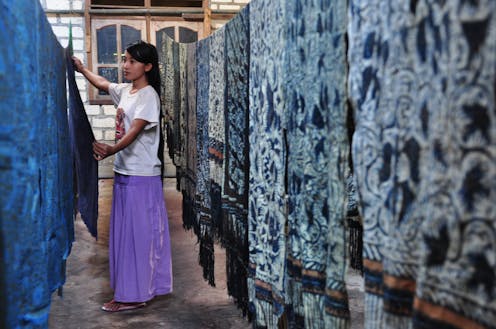that's Indonesia's task at the 2022 G20 summit
- Written by Resya Kania, Post Graduate Researcher, School of Social Policy, University of Birmingham, University of Birmingham

Studies have shown that closing the gender gap has positive impacts on the welfare of society. Research by Women World Banking[1] in 2021 illustrates how economic welfare not only depends on income and infrastructure, but also gender equality.
However, the G20 – a group of countries representing 85% of the world economy – has yet to focus on solving women’s barriers to participating and benefiting from the economy.
For instance, among the many meetings of the G20, only the one held in Brisbane, Australia[2], in 2014 resulted in a concrete commitment to improve women’s economic status. To this day, however, the Brisbane commitment has not been followed up by a clear strategy and implementation mechanism.
Indonesia hosts the G20 summit this year.
Considering its role, Indonesia can direct the G20 countries’s response to COVID-19 and promote women’s issues in the global policy agenda. Indonesia has signalled its intention to advocate inclusive economic growth by prioritising the role of women – along with young people and small businesses.
Solutions from Indonesia
Giving priority to the role of women is the right decision.
UN Women indicates[3] that women are the most affected by COVID-19 and their incomes also take longer to recover in the long term due to the nature of their work – informal, low-skilled, and involving unpaid care. The decline in gender equality in 2021[4] indicates this prediction may have come true. The gap between men and women’s economic participation has widened during the pandemic.
With a lot of research showing women’s lives are changing due to COVID-19, global leaders need to take priority measures to accompany the immediate response and longer-term recovery efforts for women.
Among all priority measures, three groups of women should be on the top target.
The first group is women in micro-enterprises.
Seven out of 10 workers[5] in the world are part of micro-businesses. Data from 99 countries show micro-enterprises account for 70% of all jobs.
World Bank data[6] indicate that women own 23% of micro and small enterprises, and the figure rises each year.
However, women earn less than men[7] for the same type of job. The International Trade Centre survey on COVID-19 impact among businesses in 136 countries has shown that women-led micro-enterprises are 27% more likely not to survive the pandemic[8], which might be caused by multiple unpaid care responsibilities.
The second group is women in the informal sector.
Over 62% of jobs in 99 countries are based in the informal sector[9]. The percentage of women in this sector is also very substantial. For example, more than 80% of women working outside the agriculture sector in South Asia make a living as informal workers. The situation is similar in Sub-Saharan Africa (74%) and Latin America and the Caribbean (54%).
Despite their immense economic contribution, women are often not granted proper worker’s rights, such as leave, health insurance or work safety insurance, as these safety nets frequently depend on formal participation in the labour force.
Women who live in rural areas are the third group.
More than three-quarters[10] of the world’s extreme poor live in rural areas.
Data[11] show girls and women are more likely to live in poor households in rural areas, compared to boys and men. Poor infrastructure in rural areas, such as access to financial services, makes it more difficult for women to participate and benefit from the economy.
Put women as the beneficiary of global economic recovery
As the global community continues to move forward to achieve inclusive economic growth, it is time for global policies to focus on placing women as the beneficiary, especially when it comes to policies regarding COVID-19 recovery.
As the G20 host, Indonesia is positioned to drive world leaders to achieve inclusive economic recovery. Indonesia can achieve this, for instance, by detailing the Brisbane commitment into detail plan and action in the two of G20’s main policy tracks: finance track[12] and sherpa track[13]. This will be a concrete step in achieving inclusive global economic recovery.
References
- ^ Women World Banking (www.womensworldbanking.org)
- ^ only the one held in Brisbane, Australia (www.ilo.org)
- ^ UN Women indicates (reliefweb.int)
- ^ decline in gender equality in 2021 (www3.weforum.org)
- ^ Seven out of 10 workers (www.ilo.org)
- ^ World Bank data (www.kemenkopukm.go.id)
- ^ women earn less than men (www.womensworldbanking.org)
- ^ women-led micro-enterprises are 27% more likely not to survive the pandemic (www.un.org)
- ^ are based in the informal sector (interactive.unwomen.org)
- ^ More than three-quarters (www.ifad.org)
- ^ Data (documents.worldbank.org)
- ^ finance track (g20.org)
- ^ sherpa track (g20.org)

















